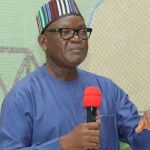The Federal Government understands the critical role the private sector plays in delivering value to the Nigerian economy, and is, therefore, focused on leveraging collaboration opportunities to usher Nigeria into a more prosperous new decade.
Vice President Yemi Osinbajo, SAN, stated this on Thursday at the official commissioning of the Bankers House of the Chartered Institute of Bankers of Nigeria (CIBN) in Abuja.
Prof. Osinbajo further noted that Nigeria is set for great heights, not only because it is “a nation of great dreamers and great doers,” but also for the resilience of its people and their great potential.
“With a population constituting the largest market on the continent, a swelling demography of ambitious, tech-savvy young people, accelerating regional integration and connection to new markets, Nigeria has been presented with an unprecedented opportunity to launch the country into a new decade of sustained prosperity. An opportunity we are fully committed, as a government, to translating into lived realities for millions of Nigerians across the country,” the Vice President declared.
He added: “every time Nigeria has been expected to sink, we have soared and risen beyond our troubles. We have drawn joy from the depths of despair and found the courage to keep going, even in the most daunting of challenges. The Nigerian spirit remains unfazed and persistently bankable.”
The VP observed that “the realization of our country’s potential, at this crucial moment, will require the careful choreography of government policies that remove every impediment in the way of those determined to pursue their dreams and build businesses.”
Prof. Osinbajo highlighted the impact of government policies in this regard, including the work of the Presidential Enabling Business Environment Council (PEBEC) towards improving Nigeria’s business environment and economy.
The Vice President noted that in the past six years, the Buhari administration, through PEBEC, has “aggressively pursued the creation of an environment that allows Nigerian businesses, at every level, operate without the bottlenecks and drawbacks that have come to characterize their interface with agencies and regulators.”
He added that the Administration is also “building on the progress of these reforms and aggregating lessons from some of the setbacks in its implementation,” with the launch of PEBEC’s 7th 60-day National Action Plan (NAP 7.0) on the Ease of Doing Business.
The NAP 7.0, which started on the 7th of February, is programmed to run until the 7th of April, 2022.
“We will consolidate on the achievements in removal of regulatory constraints around agro-exports, driving electronic filing of taxes and working closely with the States to make their own business environments friendlier,” the Vice President added.
He further restated the Administration’s commitment to follow through on its economic policies to better the lives of Nigerians.
Speaking further, the VP said, “this largely informs the zeal that has attended the ongoing implementation of our new National Development Plan, 2021-2025, a medium-term agenda that seeks to, among other things, generate 21 million full-time jobs and lift 35 million people out of poverty by 2025.”
Underscoring the importance of “a conscious reliance on private enterprise and initiative” in the successful implementation of the Plan, the Vice President said, “the plan commits the government, at all levels, to an investment of about N49.7 trillion, and envisages private sector investment of N298 trillion, making a total of N348 trillion.”
“The implementation of the plan is expected to be supported by a range of fiscal, monetary and trade measures, including more intentionally promoting productivity and value addition,” he added.
Further shedding light on the critical role of the banking sector in boosting the Nigerian economy, the Vice President explained that despite “several years of some of the most severe macroeconomic challenges – including the 2008 financial crisis, the oil crises that followed, and an unexpected pandemic, the Nigerian banking industry, owing largely to your outstanding professionalism, has continued to show incredible resilience and growth, contributing about N34.6 trillion to the country’s GDP in 2017, N37.8 trillion in 2018, N42.7 trillion in 2019 and N53.3 trillion in 2020.”
He also referenced the rise of Nigerian unicorns in recent years, stating that “in 2021 African tech startups raised over $4billion in funding, with over 564 startups across the continent solving critical problems in almost every sector. Nigeria accounted for 35% of this. Nigeria today has six unicorns, tech companies valued at over 1 billion dollars. All of them started after 2015, and have grown between two recessions.”
Commending Dr. Bayo Olugbemi, the President/Chairman of Council, alongside the executive and management of the CIBN, the Vice President noted that the commissioning of the Bankers House was clear testament of the “towering expression of enduring commitment to excellence” and “power of a collective vision in driving significant accomplishment.”
“This is why we put such great premium on the resourcefulness and strength of our private sector,” he stated.
He added that “the CIBN’s role in the private sector cannot be overstated. In laying the parameters for professional and ethical conduct, healthy competition, and continuous professional development, it has helped to guide the evolution of a banking industry that has grown to become the envy of the continent.”
The Federal Government understands the critical role the private sector plays in delivering value to the Nigerian economy, and is, therefore, focused on leveraging collaboration opportunities to usher Nigeria into a more prosperous new decade.
Vice President Yemi Osinbajo, SAN, stated this on Thursday at the official commissioning of the Bankers House of the Chartered Institute of Bankers of Nigeria (CIBN) in Abuja.
Prof. Osinbajo further noted that Nigeria is set for great heights, not only because it is “a nation of great dreamers and great doers,” but also for the resilience of its people and their great potential.
“With a population constituting the largest market on the continent, a swelling demography of ambitious, tech-savvy young people, accelerating regional integration and connection to new markets, Nigeria has been presented with an unprecedented opportunity to launch the country into a new decade of sustained prosperity. An opportunity we are fully committed, as a government, to translating into lived realities for millions of Nigerians across the country,” the Vice President declared.
He added: “every time Nigeria has been expected to sink, we have soared and risen beyond our troubles. We have drawn joy from the depths of despair and found the courage to keep going, even in the most daunting of challenges. The Nigerian spirit remains unfazed and persistently bankable.”
The VP observed that “the realization of our country’s potential, at this crucial moment, will require the careful choreography of government policies that remove every impediment in the way of those determined to pursue their dreams and build businesses.”
Prof. Osinbajo highlighted the impact of government policies in this regard, including the work of the Presidential Enabling Business Environment Council (PEBEC) towards improving Nigeria’s business environment and economy.
The Vice President noted that in the past six years, the Buhari administration, through PEBEC, has “aggressively pursued the creation of an environment that allows Nigerian businesses, at every level, operate without the bottlenecks and drawbacks that have come to characterize their interface with agencies and regulators.”
He added that the Administration is also “building on the progress of these reforms and aggregating lessons from some of the setbacks in its implementation,” with the launch of PEBEC’s 7th 60-day National Action Plan (NAP 7.0) on the Ease of Doing Business.
The NAP 7.0, which started on the 7th of February, is programmed to run until the 7th of April, 2022.
“We will consolidate on the achievements in removal of regulatory constraints around agro-exports, driving electronic filing of taxes and working closely with the States to make their own business environments friendlier,” the Vice President added.
He further restated the Administration’s commitment to follow through on its economic policies to better the lives of Nigerians.
Speaking further, the VP said, “this largely informs the zeal that has attended the ongoing implementation of our new National Development Plan, 2021-2025, a medium-term agenda that seeks to, among other things, generate 21 million full-time jobs and lift 35 million people out of poverty by 2025.”
Underscoring the importance of “a conscious reliance on private enterprise and initiative” in the successful implementation of the Plan, the Vice President said, “the plan commits the government, at all levels, to an investment of about N49.7 trillion, and envisages private sector investment of N298 trillion, making a total of N348 trillion.”
“The implementation of the plan is expected to be supported by a range of fiscal, monetary and trade measures, including more intentionally promoting productivity and value addition,” he added.
Further shedding light on the critical role of the banking sector in boosting the Nigerian economy, the Vice President explained that despite “several years of some of the most severe macroeconomic challenges – including the 2008 financial crisis, the oil crises that followed, and an unexpected pandemic, the Nigerian banking industry, owing largely to your outstanding professionalism, has continued to show incredible resilience and growth, contributing about N34.6 trillion to the country’s GDP in 2017, N37.8 trillion in 2018, N42.7 trillion in 2019 and N53.3 trillion in 2020.”
He also referenced the rise of Nigerian unicorns in recent years, stating that “in 2021 African tech startups raised over $4billion in funding, with over 564 startups across the continent solving critical problems in almost every sector. Nigeria accounted for 35% of this. Nigeria today has six unicorns, tech companies valued at over 1 billion dollars. All of them started after 2015, and have grown between two recessions.”
Commending Dr. Bayo Olugbemi, the President/Chairman of Council, alongside the executive and management of the CIBN, the Vice President noted that the commissioning of the Bankers House was clear testament of the “towering expression of enduring commitment to excellence” and “power of a collective vision in driving significant accomplishment.”
“This is why we put such great premium on the resourcefulness and strength of our private sector,” he stated.
He added that “the CIBN’s role in the private sector cannot be overstated. In laying the parameters for professional and ethical conduct, healthy competition, and continuous professional development, it has helped to guide the evolution of a banking industry that has grown to become the envy of the continent.”
The Federal Government understands the critical role the private sector plays in delivering value to the Nigerian economy, and is, therefore, focused on leveraging collaboration opportunities to usher Nigeria into a more prosperous new decade.
Vice President Yemi Osinbajo, SAN, stated this on Thursday at the official commissioning of the Bankers House of the Chartered Institute of Bankers of Nigeria (CIBN) in Abuja.
Prof. Osinbajo further noted that Nigeria is set for great heights, not only because it is “a nation of great dreamers and great doers,” but also for the resilience of its people and their great potential.
“With a population constituting the largest market on the continent, a swelling demography of ambitious, tech-savvy young people, accelerating regional integration and connection to new markets, Nigeria has been presented with an unprecedented opportunity to launch the country into a new decade of sustained prosperity. An opportunity we are fully committed, as a government, to translating into lived realities for millions of Nigerians across the country,” the Vice President declared.
He added: “every time Nigeria has been expected to sink, we have soared and risen beyond our troubles. We have drawn joy from the depths of despair and found the courage to keep going, even in the most daunting of challenges. The Nigerian spirit remains unfazed and persistently bankable.”
The VP observed that “the realization of our country’s potential, at this crucial moment, will require the careful choreography of government policies that remove every impediment in the way of those determined to pursue their dreams and build businesses.”
Prof. Osinbajo highlighted the impact of government policies in this regard, including the work of the Presidential Enabling Business Environment Council (PEBEC) towards improving Nigeria’s business environment and economy.
The Vice President noted that in the past six years, the Buhari administration, through PEBEC, has “aggressively pursued the creation of an environment that allows Nigerian businesses, at every level, operate without the bottlenecks and drawbacks that have come to characterize their interface with agencies and regulators.”
He added that the Administration is also “building on the progress of these reforms and aggregating lessons from some of the setbacks in its implementation,” with the launch of PEBEC’s 7th 60-day National Action Plan (NAP 7.0) on the Ease of Doing Business.
The NAP 7.0, which started on the 7th of February, is programmed to run until the 7th of April, 2022.
“We will consolidate on the achievements in removal of regulatory constraints around agro-exports, driving electronic filing of taxes and working closely with the States to make their own business environments friendlier,” the Vice President added.
He further restated the Administration’s commitment to follow through on its economic policies to better the lives of Nigerians.
Speaking further, the VP said, “this largely informs the zeal that has attended the ongoing implementation of our new National Development Plan, 2021-2025, a medium-term agenda that seeks to, among other things, generate 21 million full-time jobs and lift 35 million people out of poverty by 2025.”
Underscoring the importance of “a conscious reliance on private enterprise and initiative” in the successful implementation of the Plan, the Vice President said, “the plan commits the government, at all levels, to an investment of about N49.7 trillion, and envisages private sector investment of N298 trillion, making a total of N348 trillion.”
“The implementation of the plan is expected to be supported by a range of fiscal, monetary and trade measures, including more intentionally promoting productivity and value addition,” he added.
Further shedding light on the critical role of the banking sector in boosting the Nigerian economy, the Vice President explained that despite “several years of some of the most severe macroeconomic challenges – including the 2008 financial crisis, the oil crises that followed, and an unexpected pandemic, the Nigerian banking industry, owing largely to your outstanding professionalism, has continued to show incredible resilience and growth, contributing about N34.6 trillion to the country’s GDP in 2017, N37.8 trillion in 2018, N42.7 trillion in 2019 and N53.3 trillion in 2020.”
He also referenced the rise of Nigerian unicorns in recent years, stating that “in 2021 African tech startups raised over $4billion in funding, with over 564 startups across the continent solving critical problems in almost every sector. Nigeria accounted for 35% of this. Nigeria today has six unicorns, tech companies valued at over 1 billion dollars. All of them started after 2015, and have grown between two recessions.”
Commending Dr. Bayo Olugbemi, the President/Chairman of Council, alongside the executive and management of the CIBN, the Vice President noted that the commissioning of the Bankers House was clear testament of the “towering expression of enduring commitment to excellence” and “power of a collective vision in driving significant accomplishment.”
“This is why we put such great premium on the resourcefulness and strength of our private sector,” he stated.
He added that “the CIBN’s role in the private sector cannot be overstated. In laying the parameters for professional and ethical conduct, healthy competition, and continuous professional development, it has helped to guide the evolution of a banking industry that has grown to become the envy of the continent.”
The Federal Government understands the critical role the private sector plays in delivering value to the Nigerian economy, and is, therefore, focused on leveraging collaboration opportunities to usher Nigeria into a more prosperous new decade.
Vice President Yemi Osinbajo, SAN, stated this on Thursday at the official commissioning of the Bankers House of the Chartered Institute of Bankers of Nigeria (CIBN) in Abuja.
Prof. Osinbajo further noted that Nigeria is set for great heights, not only because it is “a nation of great dreamers and great doers,” but also for the resilience of its people and their great potential.
“With a population constituting the largest market on the continent, a swelling demography of ambitious, tech-savvy young people, accelerating regional integration and connection to new markets, Nigeria has been presented with an unprecedented opportunity to launch the country into a new decade of sustained prosperity. An opportunity we are fully committed, as a government, to translating into lived realities for millions of Nigerians across the country,” the Vice President declared.
He added: “every time Nigeria has been expected to sink, we have soared and risen beyond our troubles. We have drawn joy from the depths of despair and found the courage to keep going, even in the most daunting of challenges. The Nigerian spirit remains unfazed and persistently bankable.”
The VP observed that “the realization of our country’s potential, at this crucial moment, will require the careful choreography of government policies that remove every impediment in the way of those determined to pursue their dreams and build businesses.”
Prof. Osinbajo highlighted the impact of government policies in this regard, including the work of the Presidential Enabling Business Environment Council (PEBEC) towards improving Nigeria’s business environment and economy.
The Vice President noted that in the past six years, the Buhari administration, through PEBEC, has “aggressively pursued the creation of an environment that allows Nigerian businesses, at every level, operate without the bottlenecks and drawbacks that have come to characterize their interface with agencies and regulators.”
He added that the Administration is also “building on the progress of these reforms and aggregating lessons from some of the setbacks in its implementation,” with the launch of PEBEC’s 7th 60-day National Action Plan (NAP 7.0) on the Ease of Doing Business.
The NAP 7.0, which started on the 7th of February, is programmed to run until the 7th of April, 2022.
“We will consolidate on the achievements in removal of regulatory constraints around agro-exports, driving electronic filing of taxes and working closely with the States to make their own business environments friendlier,” the Vice President added.
He further restated the Administration’s commitment to follow through on its economic policies to better the lives of Nigerians.
Speaking further, the VP said, “this largely informs the zeal that has attended the ongoing implementation of our new National Development Plan, 2021-2025, a medium-term agenda that seeks to, among other things, generate 21 million full-time jobs and lift 35 million people out of poverty by 2025.”
Underscoring the importance of “a conscious reliance on private enterprise and initiative” in the successful implementation of the Plan, the Vice President said, “the plan commits the government, at all levels, to an investment of about N49.7 trillion, and envisages private sector investment of N298 trillion, making a total of N348 trillion.”
“The implementation of the plan is expected to be supported by a range of fiscal, monetary and trade measures, including more intentionally promoting productivity and value addition,” he added.
Further shedding light on the critical role of the banking sector in boosting the Nigerian economy, the Vice President explained that despite “several years of some of the most severe macroeconomic challenges – including the 2008 financial crisis, the oil crises that followed, and an unexpected pandemic, the Nigerian banking industry, owing largely to your outstanding professionalism, has continued to show incredible resilience and growth, contributing about N34.6 trillion to the country’s GDP in 2017, N37.8 trillion in 2018, N42.7 trillion in 2019 and N53.3 trillion in 2020.”
He also referenced the rise of Nigerian unicorns in recent years, stating that “in 2021 African tech startups raised over $4billion in funding, with over 564 startups across the continent solving critical problems in almost every sector. Nigeria accounted for 35% of this. Nigeria today has six unicorns, tech companies valued at over 1 billion dollars. All of them started after 2015, and have grown between two recessions.”
Commending Dr. Bayo Olugbemi, the President/Chairman of Council, alongside the executive and management of the CIBN, the Vice President noted that the commissioning of the Bankers House was clear testament of the “towering expression of enduring commitment to excellence” and “power of a collective vision in driving significant accomplishment.”
“This is why we put such great premium on the resourcefulness and strength of our private sector,” he stated.
He added that “the CIBN’s role in the private sector cannot be overstated. In laying the parameters for professional and ethical conduct, healthy competition, and continuous professional development, it has helped to guide the evolution of a banking industry that has grown to become the envy of the continent.”
The Federal Government understands the critical role the private sector plays in delivering value to the Nigerian economy, and is, therefore, focused on leveraging collaboration opportunities to usher Nigeria into a more prosperous new decade.
Vice President Yemi Osinbajo, SAN, stated this on Thursday at the official commissioning of the Bankers House of the Chartered Institute of Bankers of Nigeria (CIBN) in Abuja.
Prof. Osinbajo further noted that Nigeria is set for great heights, not only because it is “a nation of great dreamers and great doers,” but also for the resilience of its people and their great potential.
“With a population constituting the largest market on the continent, a swelling demography of ambitious, tech-savvy young people, accelerating regional integration and connection to new markets, Nigeria has been presented with an unprecedented opportunity to launch the country into a new decade of sustained prosperity. An opportunity we are fully committed, as a government, to translating into lived realities for millions of Nigerians across the country,” the Vice President declared.
He added: “every time Nigeria has been expected to sink, we have soared and risen beyond our troubles. We have drawn joy from the depths of despair and found the courage to keep going, even in the most daunting of challenges. The Nigerian spirit remains unfazed and persistently bankable.”
The VP observed that “the realization of our country’s potential, at this crucial moment, will require the careful choreography of government policies that remove every impediment in the way of those determined to pursue their dreams and build businesses.”
Prof. Osinbajo highlighted the impact of government policies in this regard, including the work of the Presidential Enabling Business Environment Council (PEBEC) towards improving Nigeria’s business environment and economy.
The Vice President noted that in the past six years, the Buhari administration, through PEBEC, has “aggressively pursued the creation of an environment that allows Nigerian businesses, at every level, operate without the bottlenecks and drawbacks that have come to characterize their interface with agencies and regulators.”
He added that the Administration is also “building on the progress of these reforms and aggregating lessons from some of the setbacks in its implementation,” with the launch of PEBEC’s 7th 60-day National Action Plan (NAP 7.0) on the Ease of Doing Business.
The NAP 7.0, which started on the 7th of February, is programmed to run until the 7th of April, 2022.
“We will consolidate on the achievements in removal of regulatory constraints around agro-exports, driving electronic filing of taxes and working closely with the States to make their own business environments friendlier,” the Vice President added.
He further restated the Administration’s commitment to follow through on its economic policies to better the lives of Nigerians.
Speaking further, the VP said, “this largely informs the zeal that has attended the ongoing implementation of our new National Development Plan, 2021-2025, a medium-term agenda that seeks to, among other things, generate 21 million full-time jobs and lift 35 million people out of poverty by 2025.”
Underscoring the importance of “a conscious reliance on private enterprise and initiative” in the successful implementation of the Plan, the Vice President said, “the plan commits the government, at all levels, to an investment of about N49.7 trillion, and envisages private sector investment of N298 trillion, making a total of N348 trillion.”
“The implementation of the plan is expected to be supported by a range of fiscal, monetary and trade measures, including more intentionally promoting productivity and value addition,” he added.
Further shedding light on the critical role of the banking sector in boosting the Nigerian economy, the Vice President explained that despite “several years of some of the most severe macroeconomic challenges – including the 2008 financial crisis, the oil crises that followed, and an unexpected pandemic, the Nigerian banking industry, owing largely to your outstanding professionalism, has continued to show incredible resilience and growth, contributing about N34.6 trillion to the country’s GDP in 2017, N37.8 trillion in 2018, N42.7 trillion in 2019 and N53.3 trillion in 2020.”
He also referenced the rise of Nigerian unicorns in recent years, stating that “in 2021 African tech startups raised over $4billion in funding, with over 564 startups across the continent solving critical problems in almost every sector. Nigeria accounted for 35% of this. Nigeria today has six unicorns, tech companies valued at over 1 billion dollars. All of them started after 2015, and have grown between two recessions.”
Commending Dr. Bayo Olugbemi, the President/Chairman of Council, alongside the executive and management of the CIBN, the Vice President noted that the commissioning of the Bankers House was clear testament of the “towering expression of enduring commitment to excellence” and “power of a collective vision in driving significant accomplishment.”
“This is why we put such great premium on the resourcefulness and strength of our private sector,” he stated.
He added that “the CIBN’s role in the private sector cannot be overstated. In laying the parameters for professional and ethical conduct, healthy competition, and continuous professional development, it has helped to guide the evolution of a banking industry that has grown to become the envy of the continent.”
The Federal Government understands the critical role the private sector plays in delivering value to the Nigerian economy, and is, therefore, focused on leveraging collaboration opportunities to usher Nigeria into a more prosperous new decade.
Vice President Yemi Osinbajo, SAN, stated this on Thursday at the official commissioning of the Bankers House of the Chartered Institute of Bankers of Nigeria (CIBN) in Abuja.
Prof. Osinbajo further noted that Nigeria is set for great heights, not only because it is “a nation of great dreamers and great doers,” but also for the resilience of its people and their great potential.
“With a population constituting the largest market on the continent, a swelling demography of ambitious, tech-savvy young people, accelerating regional integration and connection to new markets, Nigeria has been presented with an unprecedented opportunity to launch the country into a new decade of sustained prosperity. An opportunity we are fully committed, as a government, to translating into lived realities for millions of Nigerians across the country,” the Vice President declared.
He added: “every time Nigeria has been expected to sink, we have soared and risen beyond our troubles. We have drawn joy from the depths of despair and found the courage to keep going, even in the most daunting of challenges. The Nigerian spirit remains unfazed and persistently bankable.”
The VP observed that “the realization of our country’s potential, at this crucial moment, will require the careful choreography of government policies that remove every impediment in the way of those determined to pursue their dreams and build businesses.”
Prof. Osinbajo highlighted the impact of government policies in this regard, including the work of the Presidential Enabling Business Environment Council (PEBEC) towards improving Nigeria’s business environment and economy.
The Vice President noted that in the past six years, the Buhari administration, through PEBEC, has “aggressively pursued the creation of an environment that allows Nigerian businesses, at every level, operate without the bottlenecks and drawbacks that have come to characterize their interface with agencies and regulators.”
He added that the Administration is also “building on the progress of these reforms and aggregating lessons from some of the setbacks in its implementation,” with the launch of PEBEC’s 7th 60-day National Action Plan (NAP 7.0) on the Ease of Doing Business.
The NAP 7.0, which started on the 7th of February, is programmed to run until the 7th of April, 2022.
“We will consolidate on the achievements in removal of regulatory constraints around agro-exports, driving electronic filing of taxes and working closely with the States to make their own business environments friendlier,” the Vice President added.
He further restated the Administration’s commitment to follow through on its economic policies to better the lives of Nigerians.
Speaking further, the VP said, “this largely informs the zeal that has attended the ongoing implementation of our new National Development Plan, 2021-2025, a medium-term agenda that seeks to, among other things, generate 21 million full-time jobs and lift 35 million people out of poverty by 2025.”
Underscoring the importance of “a conscious reliance on private enterprise and initiative” in the successful implementation of the Plan, the Vice President said, “the plan commits the government, at all levels, to an investment of about N49.7 trillion, and envisages private sector investment of N298 trillion, making a total of N348 trillion.”
“The implementation of the plan is expected to be supported by a range of fiscal, monetary and trade measures, including more intentionally promoting productivity and value addition,” he added.
Further shedding light on the critical role of the banking sector in boosting the Nigerian economy, the Vice President explained that despite “several years of some of the most severe macroeconomic challenges – including the 2008 financial crisis, the oil crises that followed, and an unexpected pandemic, the Nigerian banking industry, owing largely to your outstanding professionalism, has continued to show incredible resilience and growth, contributing about N34.6 trillion to the country’s GDP in 2017, N37.8 trillion in 2018, N42.7 trillion in 2019 and N53.3 trillion in 2020.”
He also referenced the rise of Nigerian unicorns in recent years, stating that “in 2021 African tech startups raised over $4billion in funding, with over 564 startups across the continent solving critical problems in almost every sector. Nigeria accounted for 35% of this. Nigeria today has six unicorns, tech companies valued at over 1 billion dollars. All of them started after 2015, and have grown between two recessions.”
Commending Dr. Bayo Olugbemi, the President/Chairman of Council, alongside the executive and management of the CIBN, the Vice President noted that the commissioning of the Bankers House was clear testament of the “towering expression of enduring commitment to excellence” and “power of a collective vision in driving significant accomplishment.”
“This is why we put such great premium on the resourcefulness and strength of our private sector,” he stated.
He added that “the CIBN’s role in the private sector cannot be overstated. In laying the parameters for professional and ethical conduct, healthy competition, and continuous professional development, it has helped to guide the evolution of a banking industry that has grown to become the envy of the continent.”
The Federal Government understands the critical role the private sector plays in delivering value to the Nigerian economy, and is, therefore, focused on leveraging collaboration opportunities to usher Nigeria into a more prosperous new decade.
Vice President Yemi Osinbajo, SAN, stated this on Thursday at the official commissioning of the Bankers House of the Chartered Institute of Bankers of Nigeria (CIBN) in Abuja.
Prof. Osinbajo further noted that Nigeria is set for great heights, not only because it is “a nation of great dreamers and great doers,” but also for the resilience of its people and their great potential.
“With a population constituting the largest market on the continent, a swelling demography of ambitious, tech-savvy young people, accelerating regional integration and connection to new markets, Nigeria has been presented with an unprecedented opportunity to launch the country into a new decade of sustained prosperity. An opportunity we are fully committed, as a government, to translating into lived realities for millions of Nigerians across the country,” the Vice President declared.
He added: “every time Nigeria has been expected to sink, we have soared and risen beyond our troubles. We have drawn joy from the depths of despair and found the courage to keep going, even in the most daunting of challenges. The Nigerian spirit remains unfazed and persistently bankable.”
The VP observed that “the realization of our country’s potential, at this crucial moment, will require the careful choreography of government policies that remove every impediment in the way of those determined to pursue their dreams and build businesses.”
Prof. Osinbajo highlighted the impact of government policies in this regard, including the work of the Presidential Enabling Business Environment Council (PEBEC) towards improving Nigeria’s business environment and economy.
The Vice President noted that in the past six years, the Buhari administration, through PEBEC, has “aggressively pursued the creation of an environment that allows Nigerian businesses, at every level, operate without the bottlenecks and drawbacks that have come to characterize their interface with agencies and regulators.”
He added that the Administration is also “building on the progress of these reforms and aggregating lessons from some of the setbacks in its implementation,” with the launch of PEBEC’s 7th 60-day National Action Plan (NAP 7.0) on the Ease of Doing Business.
The NAP 7.0, which started on the 7th of February, is programmed to run until the 7th of April, 2022.
“We will consolidate on the achievements in removal of regulatory constraints around agro-exports, driving electronic filing of taxes and working closely with the States to make their own business environments friendlier,” the Vice President added.
He further restated the Administration’s commitment to follow through on its economic policies to better the lives of Nigerians.
Speaking further, the VP said, “this largely informs the zeal that has attended the ongoing implementation of our new National Development Plan, 2021-2025, a medium-term agenda that seeks to, among other things, generate 21 million full-time jobs and lift 35 million people out of poverty by 2025.”
Underscoring the importance of “a conscious reliance on private enterprise and initiative” in the successful implementation of the Plan, the Vice President said, “the plan commits the government, at all levels, to an investment of about N49.7 trillion, and envisages private sector investment of N298 trillion, making a total of N348 trillion.”
“The implementation of the plan is expected to be supported by a range of fiscal, monetary and trade measures, including more intentionally promoting productivity and value addition,” he added.
Further shedding light on the critical role of the banking sector in boosting the Nigerian economy, the Vice President explained that despite “several years of some of the most severe macroeconomic challenges – including the 2008 financial crisis, the oil crises that followed, and an unexpected pandemic, the Nigerian banking industry, owing largely to your outstanding professionalism, has continued to show incredible resilience and growth, contributing about N34.6 trillion to the country’s GDP in 2017, N37.8 trillion in 2018, N42.7 trillion in 2019 and N53.3 trillion in 2020.”
He also referenced the rise of Nigerian unicorns in recent years, stating that “in 2021 African tech startups raised over $4billion in funding, with over 564 startups across the continent solving critical problems in almost every sector. Nigeria accounted for 35% of this. Nigeria today has six unicorns, tech companies valued at over 1 billion dollars. All of them started after 2015, and have grown between two recessions.”
Commending Dr. Bayo Olugbemi, the President/Chairman of Council, alongside the executive and management of the CIBN, the Vice President noted that the commissioning of the Bankers House was clear testament of the “towering expression of enduring commitment to excellence” and “power of a collective vision in driving significant accomplishment.”
“This is why we put such great premium on the resourcefulness and strength of our private sector,” he stated.
He added that “the CIBN’s role in the private sector cannot be overstated. In laying the parameters for professional and ethical conduct, healthy competition, and continuous professional development, it has helped to guide the evolution of a banking industry that has grown to become the envy of the continent.”
The Federal Government understands the critical role the private sector plays in delivering value to the Nigerian economy, and is, therefore, focused on leveraging collaboration opportunities to usher Nigeria into a more prosperous new decade.
Vice President Yemi Osinbajo, SAN, stated this on Thursday at the official commissioning of the Bankers House of the Chartered Institute of Bankers of Nigeria (CIBN) in Abuja.
Prof. Osinbajo further noted that Nigeria is set for great heights, not only because it is “a nation of great dreamers and great doers,” but also for the resilience of its people and their great potential.
“With a population constituting the largest market on the continent, a swelling demography of ambitious, tech-savvy young people, accelerating regional integration and connection to new markets, Nigeria has been presented with an unprecedented opportunity to launch the country into a new decade of sustained prosperity. An opportunity we are fully committed, as a government, to translating into lived realities for millions of Nigerians across the country,” the Vice President declared.
He added: “every time Nigeria has been expected to sink, we have soared and risen beyond our troubles. We have drawn joy from the depths of despair and found the courage to keep going, even in the most daunting of challenges. The Nigerian spirit remains unfazed and persistently bankable.”
The VP observed that “the realization of our country’s potential, at this crucial moment, will require the careful choreography of government policies that remove every impediment in the way of those determined to pursue their dreams and build businesses.”
Prof. Osinbajo highlighted the impact of government policies in this regard, including the work of the Presidential Enabling Business Environment Council (PEBEC) towards improving Nigeria’s business environment and economy.
The Vice President noted that in the past six years, the Buhari administration, through PEBEC, has “aggressively pursued the creation of an environment that allows Nigerian businesses, at every level, operate without the bottlenecks and drawbacks that have come to characterize their interface with agencies and regulators.”
He added that the Administration is also “building on the progress of these reforms and aggregating lessons from some of the setbacks in its implementation,” with the launch of PEBEC’s 7th 60-day National Action Plan (NAP 7.0) on the Ease of Doing Business.
The NAP 7.0, which started on the 7th of February, is programmed to run until the 7th of April, 2022.
“We will consolidate on the achievements in removal of regulatory constraints around agro-exports, driving electronic filing of taxes and working closely with the States to make their own business environments friendlier,” the Vice President added.
He further restated the Administration’s commitment to follow through on its economic policies to better the lives of Nigerians.
Speaking further, the VP said, “this largely informs the zeal that has attended the ongoing implementation of our new National Development Plan, 2021-2025, a medium-term agenda that seeks to, among other things, generate 21 million full-time jobs and lift 35 million people out of poverty by 2025.”
Underscoring the importance of “a conscious reliance on private enterprise and initiative” in the successful implementation of the Plan, the Vice President said, “the plan commits the government, at all levels, to an investment of about N49.7 trillion, and envisages private sector investment of N298 trillion, making a total of N348 trillion.”
“The implementation of the plan is expected to be supported by a range of fiscal, monetary and trade measures, including more intentionally promoting productivity and value addition,” he added.
Further shedding light on the critical role of the banking sector in boosting the Nigerian economy, the Vice President explained that despite “several years of some of the most severe macroeconomic challenges – including the 2008 financial crisis, the oil crises that followed, and an unexpected pandemic, the Nigerian banking industry, owing largely to your outstanding professionalism, has continued to show incredible resilience and growth, contributing about N34.6 trillion to the country’s GDP in 2017, N37.8 trillion in 2018, N42.7 trillion in 2019 and N53.3 trillion in 2020.”
He also referenced the rise of Nigerian unicorns in recent years, stating that “in 2021 African tech startups raised over $4billion in funding, with over 564 startups across the continent solving critical problems in almost every sector. Nigeria accounted for 35% of this. Nigeria today has six unicorns, tech companies valued at over 1 billion dollars. All of them started after 2015, and have grown between two recessions.”
Commending Dr. Bayo Olugbemi, the President/Chairman of Council, alongside the executive and management of the CIBN, the Vice President noted that the commissioning of the Bankers House was clear testament of the “towering expression of enduring commitment to excellence” and “power of a collective vision in driving significant accomplishment.”
“This is why we put such great premium on the resourcefulness and strength of our private sector,” he stated.
He added that “the CIBN’s role in the private sector cannot be overstated. In laying the parameters for professional and ethical conduct, healthy competition, and continuous professional development, it has helped to guide the evolution of a banking industry that has grown to become the envy of the continent.”














